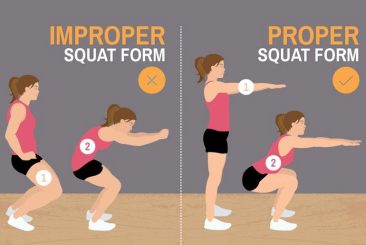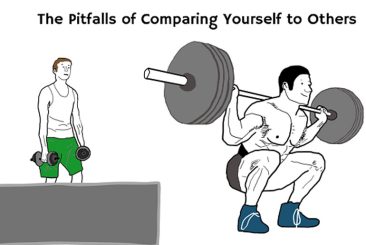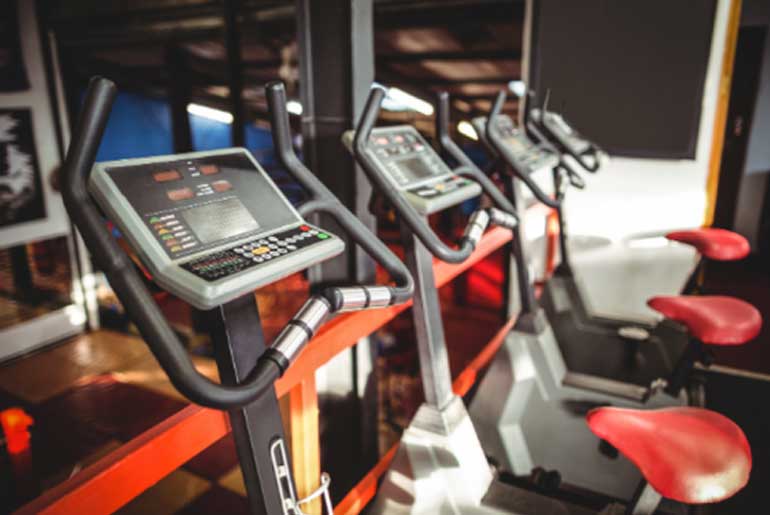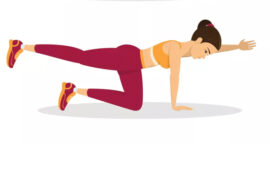Achieving fitness goals through gym workouts requires avoiding common gym mistakes that can hinder progress and cause injuries. In this article, we highlighted the crucial errors to steer clear of. Firstly, skipping warm-up exercises can increase the risk of injury and reduce performance. Secondly, maintaining poor exercise form can lead to physical harm and inefficiency. Thirdly, overtraining without sufficient rest can result in burnout and fatigue. Fourthly, neglecting nutrition can undermine workout results and overall health. Additionally, ignoring flexibility and mobility exercises can limit performance and increase injury risk. Moreover, setting clear and achievable fitness goals is essential for tracking progress and staying motivated. Lastly, comparing oneself to others can be demoralizing; instead, it’s crucial to focus on personal achievements and improvements. By avoiding these, gym mistakes, individuals can optimize their gym experience and effectively work towards their health and fitness aspirations.
- Skipping warm-up exercises: Warming up properly before starting a workout is essential to prevent injuries and optimize performance. Warm-ups play a crucial role in increasing blood flow to muscles, which enhances oxygen and nutrient delivery while promoting the removal of waste products. This process prepares the body for physical activity and helps improve flexibility, making the muscles more pliable and reducing the risk of strains or tears. Additionally, warm-ups activate the nervous system, improving coordination and reaction times. By taking the time to warm up adequately, individuals can ensure their muscles and joints are ready for the demands of the workout ahead, leading to safer and more effective exercise sessions.

- Poor exercise form: Maintaining correct form during exercises is crucial for both preventing injuries and maximizing the effectiveness of a workout. Using improper form can put undue stress on joints, ligaments, and muscles, increasing the risk of strains, sprains, or more severe injuries. By focusing on proper posture and technique, individuals can ensure that the intended muscles are targeted effectively, leading to better muscle engagement and growth. It also helps in preventing compensatory movements that may occur with incorrect form, which can lead to muscle imbalances and decreased workout efficiency. Taking the time to learn and practice proper form under the guidance of a certified trainer or instructor can significantly enhance the safety and overall benefits of a workout routine, contributing to long-term fitness success & avoid gym mistakes.

- Overtraining: Exercising too frequently or intensely without proper rest and recovery can have detrimental effects on the body. It can lead to burnout, increased fatigue, and a higher risk of injuries. To avoid these issues, it is crucial to listen to your body and incorporate regular rest days into your fitness routine. Rest days allow muscles, joints, and the central nervous system to recover and repair, reducing the risk of overuse injuries and promoting overall well-being. Adequate rest also helps prevent mental fatigue and keeps motivation levels high. By striking a balance between exercise and rest, individuals can maintain sustainable progress, avoid burnout, and ensure long-term success in their fitness journey.

- Ignoring nutrition: Your diet is a crucial factor in attaining fitness goals, and avoiding the mistake of indulging in unhealthy foods is essential. Prioritizing a balanced diet that includes a variety of nutrients is key to supporting overall health and fitness. A well-rounded diet should consist of lean proteins, whole grains, healthy fats, and a rich assortment of fruits and vegetables. These provide essential vitamins, minerals, and antioxidants that fuel the body, aid in recovery, and optimize performance during workouts. Steer clear of excessive sugary, processed, and high-fat foods that offer little nutritional value and can hinder progress. By making thoughtful and mindful food choices, individuals can fuel their bodies efficiently, maintain energy levels, and support muscle development while working towards their fitness objectives. A healthy and balanced diet complements exercise efforts, resulting in better overall well-being and a greater chance of achieving long-term fitness success.

- Doing too much too soon: Progression is a fundamental aspect of fitness, but it must be approached with caution and patience to avoid injuries. It is crucial to begin with manageable intensity and gradually increase the difficulty as one’s strength and fitness levels improve. Attempting to lift heavy weights or pushing oneself too hard too soon can put undue stress on the body and lead to strains, sprains, or more severe injuries. By starting at a comfortable level and gradually challenging the body with incremental changes, individuals can build a solid foundation and allow their muscles, joints, and connective tissues to adapt and grow stronger. Consistency and patience are key, as steady progress over time is safer and more sustainable than rushing into extreme workouts. Emphasizing proper form and listening to the body’s signals is vital throughout the fitness journey to ensure steady and injury-free progress toward achieving fitness goals.

- Neglecting flexibility and mobility: Flexibility and mobility exercises are often underrated components of a well-rounded fitness routine, but they play a crucial role in injury prevention and overall performance enhancement. Incorporating regular stretching and mobility work into one’s fitness regimen is essential for maintaining and improving joint range of motion, muscle flexibility, and functional movement patterns. Flexibility exercises help prevent muscle imbalances and reduce the risk of injuries by increasing the muscles’ elasticity and promoting better posture. Mobility work focuses on enhancing the body’s ability to move freely and efficiently, which is vital for proper execution of exercises and daily activities. By prioritizing flexibility and mobility, individuals can optimize their physical performance, alleviate muscle tension, and improve overall movement quality, leading to a healthier, more active lifestyle

- Relying solely on cardio: Incorporating both cardiovascular exercise and strength training is vital for a well-rounded fitness routine. While cardiovascular workouts offer benefits like improved heart health and endurance, solely focusing on cardio and neglecting strength training can hinder overall progress. Strength training helps build lean muscle mass, leading to increased metabolism and better fat loss results. By combining both types of exercise, individuals can achieve balanced development, enhance physical strength, and achieve a toned physique. Setting specific, achievable goals and regularly assessing progress is essential to track advancements and stay motivated on the fitness journey. Embracing this comprehensive approach to fitness will optimize overall health and lead to sustainable, long-term success in achieving fitness goals.

- Not setting specific goals: Setting specific and achievable goals is essential for effective progress tracking and maintaining motivation in one’s fitness journey. Vague or unrealistic goals can lead to confusion and frustration, making it challenging to determine whether progress is being made or not. By establishing clear objectives, such as aiming for a certain weight, running distance, or strength level, individuals can measure their advancements accurately. Regularly assessing progress allows for adjustments in the workout routine or nutrition plan, ensuring that efforts are directed towards attainable targets. Celebrating milestones along the way provides a sense of accomplishment and encourages continued dedication to the fitness journey. With a well-defined path and realistic aspirations, individuals can stay focused and motivated, fostering a positive and rewarding experience as they work towards their fitness goals.

- Comparing yourself to others: Every individual’s fitness journey is distinct, and it is crucial to avoid comparing oneself to others as it can lead to demotivation. Each person has unique strengths, weaknesses, and circumstances that influence their progress and goals to avoid gym mistakes. Instead of getting discouraged by comparing achievements to others, it is essential to focus on personal progress and celebrate even the smallest accomplishments. Every step taken towards fitness, no matter how seemingly minor, is a significant achievement worth recognizing and acknowledging. Embracing this mindset fosters a positive and sustainable approach to fitness, promoting self-motivation, self-acceptance, and a sense of fulfillment on the journey towards improved health and well-being. Remember that the ultimate goal is to be the best version of oneself, and progress should be measured against personal benchmarks rather than external comparisons.

- Neglecting rest and recovery: Rest and recovery play a crucial role in promoting muscle repair and growth. During intense workouts, our muscles undergo stress and micro-tears, which require time to heal and rebuild. Getting enough sleep is essential, as it is during deep sleep that the body releases growth hormones and facilitates the repair process. Additionally, allowing sufficient time between intense workouts is crucial to prevent overtraining and reduce the risk of injuries. When we rest, our muscles can replenish energy stores and repair damaged tissues, leading to increased strength and improved performance over time. Prioritizing rest and recovery as part of a fitness routine is fundamental for optimizing gains and maintaining overall physical health to avoid gym mistakes.

- Not seeking professional guidance: Seeking advice from a certified fitness trainer can be highly advantageous, especially for those who are new to fitness or have specific fitness goals. A certified trainer possesses the knowledge and expertise to create a personalized workout plan tailored to an individual’s unique needs and objectives. By understanding one’s fitness level, preferences, and limitations, a trainer can design an effective and safe exercise routine that maximizes results while minimizing the risk of injury. Additionally, a certified trainer can provide guidance on proper form and technique, ensuring that exercises are performed correctly to target the intended muscles and prevent any potential strain. This personalized and expert guidance significantly enhances the chances of achieving desired fitness outcomes and encourages a sustainable, long-term commitment to a healthy lifestyle and avoid gym mistakes.

Achieving fitness goals and maximizing workout effectiveness requires avoiding common gym mistakes. To do so, it’s essential to have a well-thought-out plan, focusing on maintaining proper form during exercises to prevent injuries and optimize results. Avoid overtraining by allowing sufficient rest and recovery time for the body. Incorporate strength training into your routine to build muscle and enhance overall fitness. Lastly, pay attention to your nutrition, as a balanced and nutritious diet plays a significant role in supporting your fitness journey. By staying dedicated and following a comprehensive approach, you can achieve your fitness goals, improve your overall health, and enjoy long-term success in your fitness endeavors.
Disclaimer:
The information contained in this article is for educational and informational purposes only and is not intended as a health advice. We would ask you to consult a qualified professional or medical expert to gain additional knowledge before you choose to consume any product or perform any exercise.








